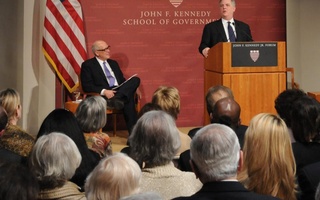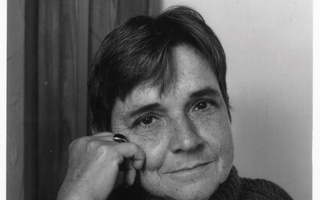
Freshman defender Marissa Gedman, shown here in earlier action, made quite an impression in her collegiate debut, tallying two assists against Yale last Friday night. Gedman’s father, Rich, played catcher for the Boston Red Sox from 1980 to 1990 and participated in some of the franchise’s most iconic moments, including Game 6 of the 1986 World Series.
At Harvard, it’s never too difficult to find an undergrad with a well-known politician, writer, or academic for a parent. But a well-known baseball player? Doesn’t happen nearly as often.
But that is indeed the case for Marissa Gedman, a freshman defender on the women’s ice hockey team. Gedman’s father, Rich, played 12 Major League seasons from 1980 to 1992 and is recognized around Boston for his 10-year stint as a catcher for the Red Sox.
“For me, it wasn’t any different than having any other dad,” Marissa says of growing up. “When I was younger I probably didn’t even understand that he was famous.”
But though Marissa may not have realized it, before she was born, Rich was a renowned figure among Red Sox Nation. He made his major league debut pinch-hitting for Hall-of-Famer Carl Yastremski in 1980 and finished runner-up in the AL Rookie of the Year voting the following season.
In 1985, a season in which he hit for the cycle and made the All-Star team, Gedman batted .295 with 18 home runs and 80 RBI. The following year, he caught Roger Clemens’ major league record 20-strikeout game and made the All-Star roster once again.
“Sometimes on accident I’ll see him on ESPN Classic,” Marissa says. “It’s so weird, and he gets so embarrassed. Usually we’ll pause it on the Tivo, and we’ll call him down...It’s really funny to see him on TV because he’s so shy and modest.”
Despite his stellar career in baseball, Rich says he never pushed Marissa when she was a child to pursue the sport he loved.
“You let your kids play what they want to play,” he says. “They experiment with everything. Her brothers played hockey, so she wanted to play.”
Marissa, who Rich says started out as a figure skater, found an immediate love in hockey and played with boys in a pee-wee league. Rich remembers that “she just had a blast.”
“My brothers had played hockey before I did, and so that’s kind of how I got into it,” Marissa adds. “Me and my brothers always played little league baseball and hockey. It’s just something we did, so I just kind of followed in their footsteps.”
Rich says that growing up, Marissa had a natural love of athletics that he did not need to promote.
“I didn’t have much influence,” he says. “I would help her whenever she wanted, but she’s very unique. She always wanted to get better. She’d want to go hit at the field and work on base-running and take groundballs...She’s driven on her own, she’s not driven by me. She was dragged around the hockey rinks and baseball fields; it just became part of what we did.”
Despite this innate drive, Marissa says that her father’s work ethic—he went undrafted yet still made his way up to the major leagues—has had a big influence on her own athletic pursuits.
“His story’s a pretty interesting one,” she says. “He always told me he wasn’t the most in shape on the team, he was never the best player on the team, but he could be sure he was the hardest working on the team...When I was younger I wasn’t always the best on the team—even today I’m not the best—but I definitely consider myself a hard worker because of what he taught me, and he definitely developed my work ethic more than I can imagine.”
Yet the lessons Rich have given his daughter have gone beyond the field of competition.
Read more in Sports
Sheeleigh, Baskind Find Success on and off PitchRecommended Articles
-
Unequal and Un-AmericanOur unequal society has now reached an economic crisis point, with America’s poor and middle classes failing to make ends meet.
-
Always Wanting MoreThere’s no reason we can’t create still higher tax brackets
-
 Frank Rich Discusses Modern Journalism
Frank Rich Discusses Modern Journalism -
Jobs and CapitalismJobs was a model of wealth acquired not due to highly leveraged, socially prestigious gambling, but due to actual inventiveness.
-
 Feminist Poet Adrienne Rich ’51 Dies at 82
Feminist Poet Adrienne Rich ’51 Dies at 82 -
The Ink-smudged Diaries of Adrienne RichYou can find Rich’s archives at Schlesinger library, in the same Yard where she attended class. Her many papers and diaries, ink-smudged, doodled-on, and worn, reveal a personal evolution as radical as that of her poetics.













